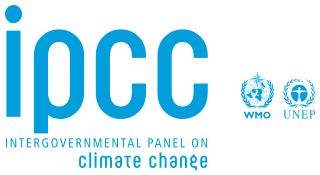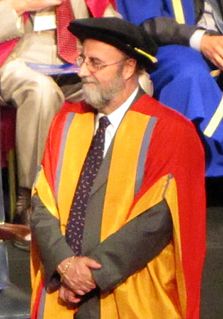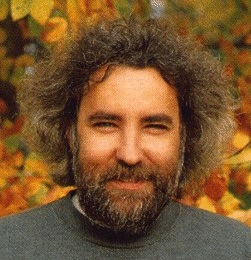
The Intergovernmental Panel on Climate Change (IPCC) is an intergovernmental body of the United Nations responsible for advancing knowledge on human-induced climate change. It was established in 1988 by the World Meteorological Organization (WMO) and the United Nations Environment Programme (UNEP), and later endorsed by United Nations General Assembly. It is headquartered in Geneva, Switzerland, and is composed of 195 member states. The IPCC is governed by its member states, which elect a bureau of scientists to serve for the duration of an assessment cycle ; the bureau selects experts nominated by governments and observer organisations to prepare IPCC reports. The IPCC is supported by a secretariat and various "Technical Support Units" from specialised working groups and task forces.

Sir Robert Tony Watson CMG FRS is a British chemist who has worked on atmospheric science issues including ozone depletion, global warming and paleoclimatology since the 1980s. Most recently, he is lead author of the February 2021 U.N. report Making Peace with Nature.
Bert Rickard Johannes Bolin was a Swedish meteorologist who served as the first chairman of the Intergovernmental Panel on Climate Change (IPCC), from 1988 to 1997. He was professor of meteorology at Stockholm University from 1961 until his retirement in 1990.

Michael Evan Mann is an American climatologist and geophysicist. He is the director of the Center for Science, Sustainability & the Media at the University of Pennsylvania. Mann has contributed to the scientific understanding of historic climate change based on the temperature record of the past thousand years. He has pioneered techniques to find patterns in past climate change and to isolate climate signals from noisy data.

Hubert Horace Lamb was an English climatologist who founded the Climatic Research Unit in 1972 in the School of Environmental Sciences at the University of East Anglia.
Professor Sir Brian John Hoskins, CBE FRS, is a British dynamical meteorologist and climatologist based at the Imperial College London and the University of Reading. A mathematician by training, his research has focused on understanding atmospheric motion from the scale of fronts to that of the Earth, using a range of theoretical and numerical models. He is perhaps best known for his work on the mathematical theory of extratropical cyclones and frontogenesis, particularly through the use of potential vorticity. He has also produced research across many areas of meteorology, including the Indian monsoon and global warming, recently contributing to the Stern review and the IPCC Fourth Assessment Report.

Sir John Theodore Houghton was a Welsh atmospheric physicist who was the co-chair of the Intergovernmental Panel on Climate Change's (IPCC) scientific assessment working group which shared the Nobel Peace Prize in 2007 with Al Gore. He was the lead editor of first three IPCC reports. He was professor in atmospheric physics at the University of Oxford, former Director General at the Met Office and founder of the Hadley Centre.
Ann Henderson-Sellers is an Emeritus Professor of the Department of Environment and Geography at Macquarie University, Sydney. She was the Director of the Joint Planning Staff (JPS) of the World Climate Research Programme in 2006 and 2007 and was the Director of the Environment Division at ANSTO from 1998 to 2005. She was the Deputy Vice-Chancellor of The Royal Melbourne Institute of Technology from 1996-1998. Prior to this she was the founding director of the Climatic Impacts Centre at Macquarie University where she continues to hold a Professorship in Physical Geography.

Philip Douglas Jones is a former director of the Climatic Research Unit (CRU) and a Professor in the School of Environmental Sciences at the University of East Anglia (UEA) from 1998, having begun his career at the unit in 1976. He retired from these positions at the end of 2016, and was replaced as CRU director by Tim Osborn. Jones then took up a position as a Professorial Fellow at the UEA from January 2017.

Roger S. Pulwarty is a scientist from Trinidad and Tobago and contributed to the work of the Intergovernmental Panel on Climate Change (IPCC). Pulwarty is the Senior Scientist in the National Oceanic and Atmospheric Administration (NOAA) Physical Sciences Laboratory in Boulder, Colorado.

Keith Raphael Briffa was a climatologist and deputy director of the Climatic Research Unit. He authored or co-authored over 130 scholarly articles, chapters and books. In his professional work, he focused on climate variability in the late Holocene, with a special focus on northern portions of Europe and Asia. Briffa's preferred method was dendroclimatology, which is a set of procedures intended to decode information about the past climate from tree rings. Briffa helped develop data sets from trees from Canada, Fennoscandia, and northern Siberia which have been used in climate research.

Corinne Le Quéré is a French-Canadian scientist. She is Royal Society Research Professor of Climate Change Science at the University of East Anglia (UEA) and former Director of Tyndall Centre for Climate Change Research. She is the chair of the French High Council on Climate and member of the UK Climate Change Committee. Her research focuses on the interactions between the carbon cycle and climate change.
Julie Michelle Arblaster is an Australian scientist. She is a Professor in the School of Earth, Atmosphere and Environment at Monash University. She was a contributing author on reports for which the Intergovernmental Panel on Climate Change (IPCC) was a co-recipient of the 2007 Nobel Peace Prize. Arblaster was a lead author on Chapter 12 of the IPCC Working Group I contribution to the IPCC Fifth Assessment Report in 2013. She has received the 2014 Anton Hales Medal for research in earth sciences from the Australian Academy of Science, and the 2017 Priestley Medal from the Australian Meteorological and Oceanographic Society. She has been ranked as one of the Top Influential Earth Scientists of 2010-2020, based on citations and discussion of her work.
Jean Palutikof is founding Director of the National Climate Change Adaptation Research Facility (NCCARF) at Griffith University in Queensland, Australia. She has held this position since 2008. Prior to this, Professor Palutikof was based at the UK Met Office during which time she managed the production of the Intergovernmental Panel on Climate Change (IPCC) Fourth Assessment Report for Working Group II.
Peter William Thorne is a climatologist and professor of physical geography in the Department of Geography, Maynooth University.

The contributions of women in climate change have received increasing attention in the early 21st century. Feedback from women and the issues faced by women have been described as "imperative" by the United Nations and "critical" by the Population Reference Bureau. A report by the World Health Organization concluded that incorporating gender-based analysis would "provide more effective climate change mitigation and adaptation."
Venkatachalam Ramaswamy is the Director of the Geophysical Fluid Dynamics Laboratory of the National Oceanic and Atmospheric Administration (NOAA) Office of Oceanic and Atmospheric Research (OAR), studying climate modeling and climate change. "A leading climate scientist", his work is cited as supporting evidence for significant stratospheric climate change. He focuses in particular on radiative transfer models and the hydrologic cycle in the atmosphere. He has actively supported the development of supercomputing approaches that enable researchers to achieve higher resolution and greater complexity in climate models. As a lead author involved in the Intergovernmental Panel on Climate Change (IPCC), Ramaswamy's contributions was recognised by the joint award of the 2007 Nobel Peace Prize to the IPCC.

Raymond Ward Arritt was an American agronomist whose research focused on agricultural meteorology. He taught at Iowa State University from 1993 until his death in 2018. At Iowa State, he was responsible for operating the meteorological data repository Iowa Environmental Mesonet. He was one of three Iowa State faculty who contributed to the fourth (AR4) Intergovernmental Panel on Climate Change (IPCC) assessment report, which led to the IPCC sharing the 2007 Nobel Peace Prize with Al Gore.

James Arthur Renwick is a New Zealand weather and climate researcher. He is professor of physical geography at Victoria University of Wellington, specialising in large-scale climate variations. He was awarded the 2018 New Zealand Prime Minister's Science Prize for Communication by Jacinda Ardern.












